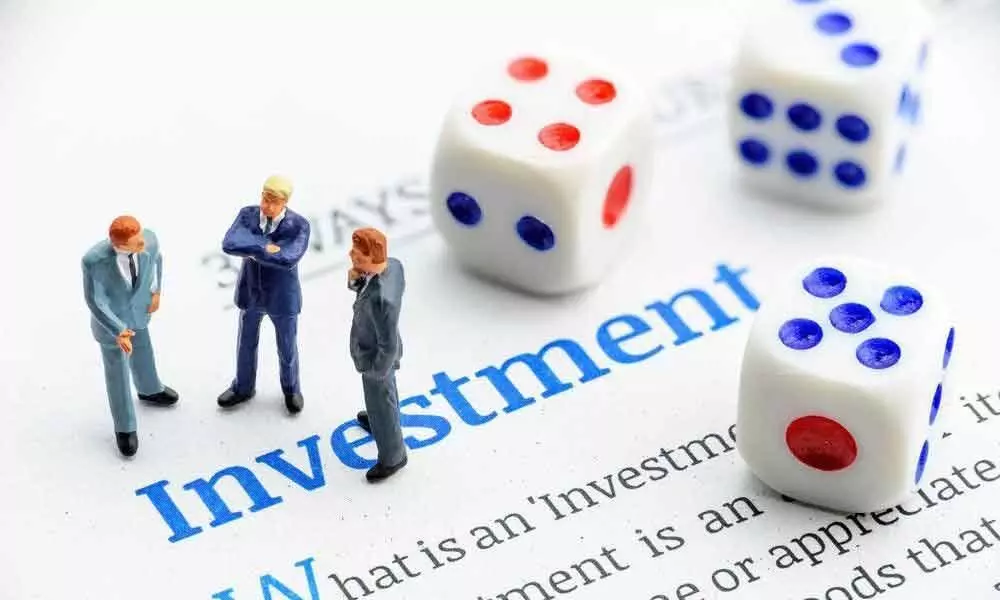Risk can't be avoided but only mitigated

When discussing about return and risk associated with an investment, the general tendency of the investors is to assess the risk in a quantum.
When discussing about return and risk associated with an investment, the general tendency of the investors is to assess the risk in a quantum.
This way one could make up their mind of what it would cost or benefit them through an investment. So, when forecasting or assuming returns, we manage to put a percentage figure as return over a certain period of time. Thus, we arrive at a decision if a particular investment avenue is profitable or productive to be considered.
But, how does one assess the risk, would it be similar to that of how the returns are calculated? I mean, a percentage of loss is what one could perceive if an investment would not turn out to be?
While playing cards, etc. the randomness has a method and the probabilities kick in to support a bet. In a blackjack game for instance, we know in advance how many cards and of which cards are there in a deck. Of course, one needs a higher skill to count which cards are already drawn from the deck and which are not.
But, at least there's a logic to what you bet if we manage to calculate and thus the probability of our win. The risk thus is limited that probability only. In real world, how do we assess the risk of an investment, say stocks. We could mark up the valuation if a company wins a project or bid of a contract.
We would be able to estimate the possible gains out of a particular project and the deviation would be due to the productivity gains or losses.
The other way is that the valuation wouldn't get marked down purely 'coz a company loses the bid as another competitor gets it but in reality, there's a high possibility of at least, a temporary dip in the stock price.
The event despite a business risk, would have an impact on the price due to the reaction by the market participants and their views which range from a budding competition to the existing player or the inability of the current player to promptly gain the bid, etc.
So, it's not just important for one to buy a right stock but also buy at a right price. As Howard marks said, it's not a matter of what you buy but what you pay for it.
What if a new government comes and cancels all their earlier agreements, how do we built-in this risk and what happens to the stock valuation? Yes, one might look at the extent of revenue loss due to this development and hence arrive at the corrected price.
Here again, there would be an uneven reaction from the investors as they dump the stock and the price plummets much beneath the actual loss it would otherwise incur.
So, a risk or a risk-event is a not about percentage losses but it's almost like binary: Zero and One. It's about wiping out the investments, a loss of capital and not a mere lesser return than planned.
When events of global scale for example, 9/11 attacks on America, the OPEC oil embargo of '73, etc. were completely surprise events and the repercussions across the world are huge.
Domestically too events like '91 Balance of Payments (BoP crisis), IL&FS collapse were huge and have higher negative consequences across the board.
When forecasts were made, none of these events were considered and hence the surprise. People remained completely unprepared for these events and only reacted in panic.
Then how do we plan for an imaginary risk because the more we think, the deeper we exhaust the possibilities and when an event happens it still would be the unimagined, leading us to greater surprise.
Moreover, it's of greater importance for us to know how we respond to these surprises and we can't' forecast that much but certainly take cues from our past behavior.
Daniel Kahneman described that dreaming about sitting on a bench brings more joy than actually being on a bench because in the dream you're not thinking about getting hit by mosquitos or having heartburn from lunch, which is what happens in the real world.
So, preparing for surprises doesn't mean that our portfolios are immune to shocks of the world, but how we handle ourselves well during those turbulent times. Accept that risk is inherent and can't be avoided, prepare mentally that it would occur, only the timing is unclear.
The best way is to provide for higher provisions while planning i.e. by having lesser return expectations and seepages in the portfolio thus the end plan is achieved.
(The author is a co-founder of "Wealocity", a wealth management firm and could be reached at [email protected])




